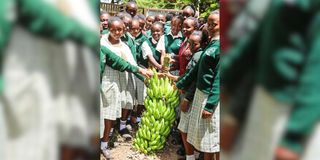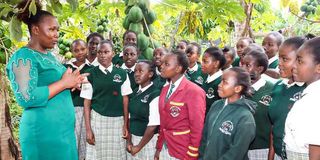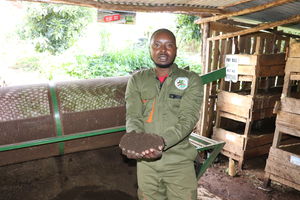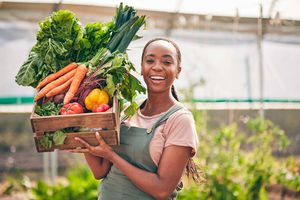
Katutu Girls Secondary School principal Nancy Gitonga with agriculture Students at the rabbit hutch.
Kitui West Sub-County has a unique landscape that is characterised by rolling hills. On the roads are tens of cattle, sheep and goats searching for pasture and water.
Katutu Girls Secondary School is a hive of activities in the evening during the Club Day. The Agriculture Club members and their patrons are at the school farm when the Seeds of Gold team arrives.
“We are on a mission to make Katutu Girls Secondary School a farming hub and centre of agriculture innovation and learning,” says Naomi Kieti, a Form Four student.
The school sits on 25 acres but only two are used in the production of pawpaws, bananas, sukuma wiki, spinach, tomatoes, green grams, sugarcane, mangoes, onions and a few other seasonal crops.
The girls also have the knowledge and skills of taking care of donkeys, rabbits, chickens, dairy goats and cows.
“We get a balanced diet from what the club produces,” Kieti says.
With their knowledge on smart agriculture, the students have adopted vertical gardens and zai pits in the production of early-maturing crops. Harvesting is throughout the year.

Agriculture students at Katutu Girls Secondary School in Kitui West display their harvested bananas on May 1, 2025.
Blessed Nyawira, another 4K Club member, says the farm is attended to during Agriculture lessons, Club Days and on weekends.
She says land preparation, planting, watering, weeding, harvesting and storing harvests are allocated to different groups. The farm is also a ground for practical lessons.
Nyawira, who aspires to be a medical doctor, says the school administration supports the club by ensuring students get seedlings and certified seeds.
“We are also provided with watering cans and farmyard manure,” Nyawira says.
Under the supervision of their agriculture teachers and farm manager, the students are shown the right way of applying herbicides, pesticides and fertiliser.
Nyawira says club members attend the annual Agricultural Society of Kenya (ASK) fair to get more information on programmes designed by the Ministry of Agriculture and Livestock Development that target young people.
“Our teachers encourage us to ask government officials as many questions as possible. We also get an opportunity to network and establish relations with farmers in Kenya and other parts of the continent,” she says.
Dalphine Mueni, the agriculture teacher, said students have learnt to design and keep farm records.
“Every section of animal farming has a manager who keeps production and feeding records. These give insights into the operations,” the teacher says, adding that there are records for egg production, poultry performance, milk production and crop harvests.

Agriculture teacher, Dalphine Mueni, speaks to students at the school farm.
The girls also keep health records that are used to monitor the well-being of animals.
“There are feed records too. With that, the girls can follow the economic result of feed usage,” she says.
The records help in following production trends and allocating resources.
Katutu Girls Secondary School principal, Nancy Gitonga, says she has always had a passion for farming.
When she was transferred to the school in 2022, she arrived with banana suckers that have assisted the institution and the surrounding community.
“Kitui is dry but the region has fertile and productive soils,” she says. “We can turn Kitui into a food basket, just like Embu, Nyandarua, Laikipia and several other dry counties.”
She says the produce is sold during the holidays and the money ploughed back into the school.
Most new club members need to be trained on handling the animals and crops like sukuma wiki and onions.
“Many do not know how to harvest crops but they are fast learners,” she says.
Timely harvesting ensures quality yields and good prices.







